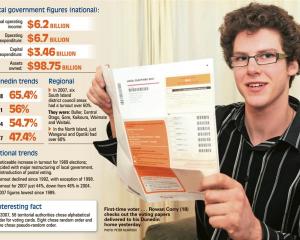Local Government Minister Rodney Hide is defending his push to get councils to focus on core services and says ratepayers don't get a chance to put the brakes on big spending projects.
In a cabinet paper Mr Hide put the case for a review of local government which would look at what its role was and seek greater transparency. He also suggested holding referenda before major spending was undertaken.
The Government has approved the review.
Labour leader Phil Goff has accused Mr Hide of seeking to remould councils into corporations and said his reforms would clear the way for privatisation of assets and services.
"They (the reforms) will strip councils of many functions which are essential to ensuring their local communities are able to function as communities."
Mr Goff said a plan to introduce referenda on council spending issues was ironic when the Government had ruled out a referendum on the Auckland super city proposal.
"The public is already deeply unsettled by the handling of the super city reforms and news of the second, unheralded, tranche of reforms will turn that into real anger," Mr Goff predicted.
Green Party co-leader Russel Norman yesterday made similar criticisms.
He was highly critical of plans to conduct "some targeted consultation" - "which presumably means checking with the Business Roundtable".
Speaking on Radio New Zealand this evening, Mr Hide said it would not make sense to have a referendum on the super city.
"If I could reduce the super city question to a yes or no then that would be a lot easier," he said.
However, that proposal was complicated and people could have a say on a wide range of issues before the select committee when they would have been unable to if there was a referendum.
Mr Hide said he wanted to see analysis done on his proposals.
"People, particularly those on fixed incomes are concerned about their rates going up and some of the ventures that their councils have got into without actually going back to the people," he said.
"What I've asked for is work to be undertaken on making the financial position of local councils much more transparent to ratepayers ... so that ratepayers can have a sense of what projects are going to be costing them.
"I also think that ratepayers should be able to have a say about expenses staying at say the rate of inflation rather than increasing the way they are planned to do on an average across New Zealand by nearly 50 percent in the next 10 years."
Mr Hide said while councils may include spending plans in annual reports they did not tend to campaign on spending issues during election campaigns and it has hard for ratepayers to have influence.
A recent Internal Affairs report found income from rates would increase 47 percent over next decade, and debt would double to more than $10 billion. However, drivers were price and population increases and compliance costs plus community expectations about services provided.
Mr Hide said there needed to be better mechanisms to match expectations to costs.
"Ratepayers aren't confronted with the trade-offs," he said.
Asked if core services would include art galleries, swimming pools and council flats, Mr Hide said they would "up to a point".
He said councils were investing a lot of money in quite risky ventures and gave examples of lotto shops, banks, hotels and property development.
Prime Minister John Key yesterday said what local councils spent their money on and how much they spend was up to them, and he did not support capping their expenditure.
He said he would await results of the review before making specific decisions.
Mr Hide has his supporters - Grey Power issued a statement calling for rates increases to only meet inflation and for binding referenda for non-core projects.
Local Government Forum chairman Charles Finny said the review would be good for businesses and farmers.
"We think the local government sector has expanded its sphere of activity too widely in recent years and it has not had the sufficient disciplines on it to contain its expenditure."
He said there was also inadequate monitoring of spending.
The review should be completed and reported to Cabinet's economic growth and infrastructure committee by August 31.



